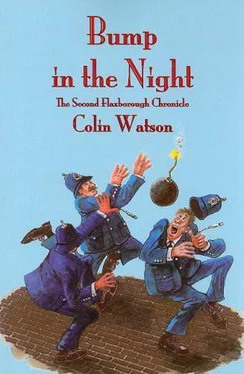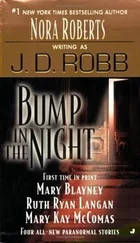Within ten minutes the late Alderman Berry’s favourite beverage was fast filling his hollow legs.
Mr Kebble liked rain. It protracted and seemed to make more intimate, more productive of confidences, the visits of his friends and informants. On fine days they merely looked in to deliver the bare bones of a story, were content sometimes to toss them from the doorway. Kebble, like a fat but agile pug, caught them easily enough and expertly digested them, but he much preferred to make leisurely and careful selection from the offerings of callers who were not for ever looking at his clock and saying, ‘Ah, well’ or ‘Good Lord!’ Visitors marooned by the weather never behaved like this. They sat, as Mr Grope was sitting now, well back in their chairs and carelessly signalled time’s winged chariot to overtake.
“It didn’t exactly wake me, mind,” Grope said. “Nothing ever wakes me. Only worry sometimes. Left over thoughts, you know—they lie like pastry. But I must have heard it, all the same. As soon as the better half came up with my breakfast this morning I sat up and said, ‘There’s been another one.’ She knew what I meant and I was right.”
Kebble nodded happily. News of the posthumous execution of Alderman Berry, whom he remembered as an incorrigible hand-shaker and tops for humility among the highly competitive penitents of the New Zion Brotherhood, had put him in an even better humour than usual.
“Do you reckon there’s any connection?” he asked.
“Connection with what?”
“Why, that park business. The drinking fountain.” Grope considered. “It may very well be,” he said after a while, “that both crimes were the work of the self-same...” He searched for the word.
“Miscreant.” This timely contribution came from Leonard Leaper, who was standing at one side of the editor’s desk and following the conversation like a starving footman at a banquet.
Grope turned his sad eyes slowly towards the reporter. “I was talking to Mr Kebble,” he said.
The editor waved Leaper to his own desk. “I’m still waiting for the Ferguson wedding. Did you collect the form?”
The youth held aloft a grubby sheet of paper.
“Good,” said Kebble. “Write it. By the way, just remember that for our purposes marriages are neither consummated or ‘solomonized’. And for God’s sake don’t ever again describe the bridesmaids as wearing Dutch caps.” He returned his attention to Grope.
“There was a film being shown to our patrons last week,” the commissionaire resumed thoughtfully, “that was all about a man who was unjustly convicted of someone else’s misdoings. And when he came out of prison he was an enemy of society and did a lot of dreadful things that were much worse than the one he had been sent to prison for not doing, if you follow me. There was some blowing up in it, I remember, and...” He lapsed into silence.
“Yes?” Kebble prompted.
“I don’t know. I always had to leave at that part and check the ice cream trays. Mrs Hardacre in back stalls said she’d take it over on the Saturday but she must have forgotten because she didn’t come out until it was time to put her harness on and then it was Coming Attractions.”
“Oh dear,” said Kebble politely.
“So you see the person I think the police ought to be looking for is someone here in the town who’s been turned into an enemy of society—perhaps through being sent to prison for a crime he didn’t commit.”
“That ought to be a lot easier,” Kebble daringly remarked, “than having to pick from all the people in Chalmsbury who haven’t been sent to prison for things they did commit.”
A tiny spot of pink appeared in the centre of Grope’s vast dewlap. For a moment Kebble thought his visitor was going to look at the clock. He hastened to placate him. “You’ve an idea there, Walter. Somebody wanting to get his own back. A bit unbalanced, maybe.”
Grope condescended to expand his theory. The wilful destruction of one monument and the marring of another indicated vengefulness, he thought, of a special kind. Both the commemorated gentlemen had been magistrates. Did not this fact lend strength to his suggestion that the perpetrator was the brooding victim of a miscarriage of justice ? In that case, it was to be expected that the object of the next outrage—if there were one—would be part of the same pattern. The representation of a magistrate, or another memorial to one. Was Kebble still with him? Yes; well, then.
The only targets of such a kind that survived in the town—and Grope had given the matter exhaustive consideration—were the portrait of Mrs Courtney-Snell in W.V.S. uniform that hung in the reading room of the public library (Kebble mentally rubbed his hands at the thought of the eclipse of this Gorgonian image) and the noted Chipchase tenor bell presented to St Luke’s Church by William Chipchase, canning merchant, three years previously.
“Those are what we’ll have to watch now,” counselled Grope. “If he picks on one of those we’ll know for certain the fellow’s an ex-convict. That should give the police a very useful lead.”
“You’ve taken the brewers off your list then, Walter?”
“Ah”—Grope raised a finger—“just a minute. You might think I was joking about that the other week. Being flippant, perhaps?”
“Not at all, old chap.”
“No. Well listen. There does happen to be one other way of looking at this business. It might be the law that this man wants to get even with: we’ve considered that. Or it might”—Grope lowered his voice—“it might be that he’s got a down on temperance!”
Kebble looked shocked.
Grope leaned forward very slightly in his chair. “Take the drinking fountain, now. Temperance—a perfect model of temperance. And now poor Arnold Berry. A magistrate, I grant you. But sobriety itself.”
The editor pondered this paradox.
Grope sat back again and folded his hands. “It’s quite simple,” he said. “Whatever gets blown up next will tell us who the...”—his eye flickered to Leaper—“the miscreant is. The portrait or the bell: gaolbird. But a dairy or the Salvation Army barracks, or something of that kind: seek out the son of Bacchus.”
“What a field that would offer,” murmured Kebble.
This time Mr Grope really did look up at the clock. And he said: “Ah, well...”
Chapter Five
Mr Grope was not the only one who sought a connection between the two explosions. Leonard Leaper also gave the matter thought. His reasoning was conditioned by regular absorption of radiation from the Daily Sun .
This vital journal, the joining of whose staff was Leaper’s idea of ultimate beatitude, had taught him that any two consecutive events that displayed the slightest similarity were a series. So he knew that what had disturbed Chalmsbury was a succession of crimes that promised the indefinite recurrence in headlines of phrases like ‘strikes again’. This was satisfactory for, like all true devotees of the Daily Sun , Leaper cherished continuity and liked life’s amazements to conform to established definitions.
Thus, although he would have dismissed as futile the subtle theorizing of Grope, he quickly spotted and approved the coincidence of both explosions having been set off on the same night of the week. The third, he was sure, would take place on a Tuesday also.
Tonight, perhaps: why not?
He had therefore prepared himself, if not for a probe, at least for a vigil.
Chalmsbury was not a large town and he calculated that an unobtrusive patrol of a few of its streets after midnight might easily enable him to catch sight of the dynamiter in time to stalk him to his objective. Optimism was another quality Leaper had acquired from the Daily Sun .
Читать дальше












